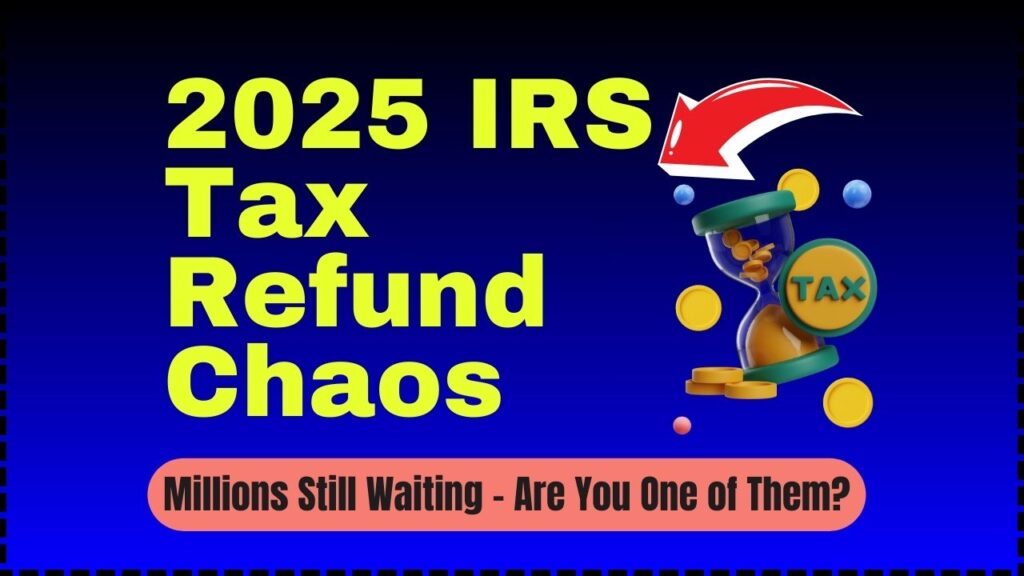
2025 IRS Tax Refund Chaos: As the 2025 tax season unfolds, millions of Americans are experiencing unprecedented delays in receiving their IRS tax refunds. From layoffs at the IRS to processing backlogs, the situation has left many wondering when they’ll get their much-needed refunds. If you’re still waiting, you’re not alone. Let’s dive into the reasons behind the delays, what you can do about it, and how to avoid issues in the future.
2025 IRS Tax Refund Chaos
The 2025 tax season presents unique challenges, with millions facing refund delays due to IRS layoffs, processing backlogs, and enhanced fraud checks. While the waiting can be frustrating, staying informed and using IRS tools can help ease the anxiety. Filing electronically, opting for direct deposit, and ensuring accuracy in your tax return are key steps to minimizing delays. As tax laws and IRS procedures continue to evolve, staying updated is crucial for a smooth filing experience.
| Feature | Details |
|---|---|
| Tax Season Start Date | January 27, 2025 |
| IRS Employee Layoffs | Over 6,000 employees laid off during peak filing season |
| Standard Refund Processing Time | Typically less than 21 days for e-filed returns |
| Current Processing Delays | Refunds may take significantly longer due to staffing cuts and backlog |
| Refund Status Check | Use the IRS “Where’s My Refund?” tool |
| Common Causes of Delays | Staffing shortages, incomplete forms, identity verification |
| Official IRS Website | www.irs.gov |
Why Are Refunds Delayed in 2025?
1. IRS Layoffs and Staffing Shortages
A surprising announcement of over 6,000 IRS employee layoffs during peak tax season has severely impacted processing speeds. This decision, part of federal workforce reductions, led to a backlog in reviewing and approving tax returns. Tax experts warn of longer waiting periods for refunds, especially for paper-filed returns.
2. Increased Fraud Checks and Identity Verification
To combat rising identity theft cases, the IRS has intensified fraud checks and identity verification processes, causing further delays. This step is essential for security but slows down refund approvals.
3. Technical Glitches and Backlog
The IRS is also dealing with technical issues on its online platforms, contributing to the backlog. As of early 2025, the agency reported over 10 million unprocessed returns from the previous tax season.
How to Check Your 2025 IRS Tax Refund Status?
While waiting for your refund, it’s essential to stay updated on its status. The IRS offers the “Where’s My Refund?” tool, which provides real-time updates. To use this tool, you’ll need:
- Social Security Number (SSN) or ITIN
- Filing Status (e.g., single, married filing jointly)
- Exact Refund Amount claimed on your return
Access the tool here: Where’s My Refund?
Note: The IRS updates the tool once daily, usually overnight, so there’s no need to check multiple times a day.
Common Causes of Tax Refund Delays
1. Incomplete or Inaccurate Information
Any errors in your personal details, such as incorrect Social Security numbers or misspelled names, can cause delays.
2. Identity Verification
If the IRS suspects identity theft or fraud, they may request additional verification, slowing down the refund process.
3. Claiming Certain Tax Credits
Returns claiming the Earned Income Tax Credit (EITC) or the Additional Child Tax Credit (ACTC) often take longer due to extra fraud checks.
4. Filing Paper Returns
Paper returns take longer to process. E-filing is recommended for faster processing.
Steps to Potentially Expedite Your Refund
- File Electronically: E-filing is processed faster than paper returns.
- Opt for Direct Deposit: This is the quickest way to receive your refund.
- Double-Check Your Return: Ensure all information is accurate to avoid delays.
- Respond Promptly to IRS Notices: If the IRS needs additional information, respond quickly to avoid prolonged delays.
What to Do If Your Refund Is Delayed?
1. Wait at Least 21 Days Before Contacting the IRS
If you filed electronically, wait at least 21 days before contacting the IRS. For paper returns, wait at least 6 weeks.
2. Use the IRS Tools
- Where’s My Refund? for checking refund status.
- IRS2Go App: Mobile app for refund updates.
3. Contact the IRS If Necessary
If it’s been longer than the expected processing time, contact the IRS at 1-800-829-1040.
Avoiding Tax Refund Delays in the Future
- File Early: The earlier you file, the sooner you’ll receive your refund.
- Double-Check Information: Ensure all personal and financial details are accurate.
- Choose E-Filing and Direct Deposit: These methods are faster and more secure.
IRS Fires Thousands Right Before Tax Deadline – Will Your Tax Return Be Delayed?
IRS Income Tax Refund Schedule for 2025 – Important Dates You Need to Know
IRS Hit with Layoffs as DOGE-Fueled Budget Cuts Shake Up Tax Season!
Frequently Asked Questions (FAQs)
1. How long will my refund take this year?
Refunds for e-filed returns typically take 21 days, but delays are expected in 2025 due to staffing shortages.
2. How can I check the status of my refund?
Use the IRS “Where’s My Refund?” tool or the IRS2Go App.
3. What should I do if the IRS needs more information?
Respond to any IRS notices promptly to avoid further delays.
4. Can I call the IRS to speed up my refund?
No, calling the IRS won’t expedite your refund. It’s best to wait at least 21 days before contacting them.
5. Are refunds delayed for those claiming the Earned Income Tax Credit (EITC)?
Yes, refunds for EITC and ACTC are typically delayed due to extra fraud checks.







